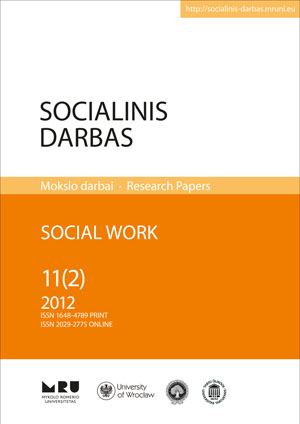Tėvų į(si)traukimas į vaikų ugdymą: ar tai problema Lietuvos mokyklose?
Parental Involvement in Children Education: Is It a Problem in Lithuanian Schools?
Author(s): Gražina Čiuladienė, Antanas ValantinasSubject(s): Social Sciences
Published by: Mykolas Romeris University
Keywords: school; parents; involvement in children’s education; cooperation; school evaluation
Summary/Abstract: Promising theoretical frameworks for parental involvement emerged when J. Epstein suggested a widely recognized typology to account for different levels of parental involvement in their children’s education. Four types of parental involvement were identified: basic obligations; school-to-home communications; parent involvement at school; and parent involvement in learning activities at home. Later the author expanded the typology and defined six levels (types) of school-related opportunities for parental involvement. But J. Epstein views the parental involvement mainly from the perspectives of schools and is concerned primarily with what schools with what teachers can do to stimulate more active parental involvement. This theory showed the possibilities of engaging parents in a variety of school settings. From another point of view this theory sometimes is valued as stressing top-down communication from educators to parents. A community based relational approach to parent engagement in school stresses tries to build relationships among parents as a basis for their collective participation. This approach starts with relationships that create conversations, in order to give parents an opportunity to articulate their own concerns (M. Warren, S. Hong, C. L. Rubin, P. Sychitkokhong 2010). The objective of our research was analysis of the data base of the National Agency of School Evaluation, with the aim to identify prevailing forms of parental involvement in their children’s education. The reports, record sheets and other documentation of 196 school evaluations were analyzed. The evaluation of these schools was made during the period of the 2009-2011 year. According to the school localization, 41,8% were rural schools, 36,2% were city schools and 21,9% were town schools. 40% of the sample was made up of basic schools, 28%—gymnasiums, and 21% were secondary schools. According to the results of this analysis, several conclusions were formulated: • Individualistic engagement of parents in their children’s education dominates in the sample of 196 schools. • School activities can be characterized as stop-down communication from educators to parents. Often the school’s invitations were not perceived by parents as a personal invitation to become engaged in their children education.
Journal: Socialinis darbas
- Issue Year: 11/2012
- Issue No: 2
- Page Range: 401-410
- Page Count: 10
- Language: Lithuanian

